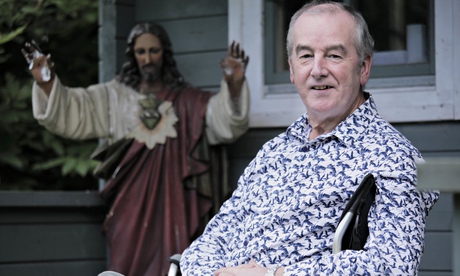
Born in Newcastle, David Almond trained to be a teacher, thinking it would fit in well with his dreams of becoming a writer. It didn't. But after he started selling short stories to magazines, he eventually resigned, and went on to write Skellig, the children's book about an angel/tramp who lives in a garage. It won him the Carnegie medal and the Whitbread children's award, and his subsequent children's books, from Kit's Wilderness to The Fire-Eaters, have packed his shelves with further prizes. In his latest novel, The Tightrope Walkers, he returns to writing for adults.
The Tightrope Walkers tells the story of Dom, growing up in the 60s on a council estate by the Tyne. How much of it echoes your own childhood?
It draws in lots of elements of my own past. I grew up on a council estate on Tyneside. Several members of my family worked in shipyards, and once, when I was a student, like Dom I did two sessions working in one. I was a tank cleaner, and it was absolutely terrifying, one of the most scary things I have ever done.
How about the bookshop in Newcastle, where Dom entertains dreams of one day becoming a writer himself?
It's a real bookshop, and it was fantastic. I used to go there to seek out small press pamphlets and poetry, and I was dreaming of being a writer, too – writing poetry, probably some terrible stuff. That [being a writer] was always the thing inside me.
Dom is the first person in his family to go to university. The Tightrope Walkers shows the widening divide between him and his father, who works in the shipyards, and how both of them try to address it. Were you also the first in your family to go to university?
Yes, I was the first. I have a very Tyneside Catholic background: during the war my dad went to Burma, like Dom's dad, and when he came back he believed that everyone should get an education. Then you go and get an education and inevitably it separates you from the place you came from. I think that's one of the forces behind my writing – to become what I've become, but somehow to acknowledge the place I came from. It's one of the reasons I use the local language – it's a way of keeping in contact with my roots.
In The Tightrope Walkers you take care to spell out the dialect: there is a lot of "bliddy" and "aye".
Obviously it is a very northern book. But the more I go on, the more I love the language. As a writer I love working with the beauty of language, and more and more I love the beauty of the northern language, the beauty of the dialogue. One of a writer's jobs is to keep language alive, to not homogenise it. It is up to the people who come from places like this to be ourselves, and not deny ourselves. That's what I'm doing as a writer.
Where did you write the book?
In a fantastic library in Newcastle, the Lit & Phil. I go there to write – it's quite busy, but I like that. I'm quite messy – I make lots of notes and scribbles and doodles; then, when I settle into a routine, I have to write a certain number of words a day. I've even got a chart… I'm very obsessive about it. When I'm into it, I can do 1,000 words a day.
Do you enjoy it?
On the one hand it's a slog to put the pages together, but within it there's a great, playful sense of language, which keeps me going.
Who are your influences?
Lots of American writers are very important to me. Flannery O'Connor is a massive influence: she was a southern states Catholic writer, writing about regional settings, and she has said so many things which spoke to me. Raymond Carver, for the apparent simplicity of the language, and Hemingway, Márquez and Heaney. One of the things which has also really influenced me is Lindisfarne – the gospels, and St Bede. I constantly keep trying to draw Lindisfarne into my work.
What are you writing now?
At the moment I'm working on something a bit different – this September the Great North Run will become the first race in the world to have one million finishers, so they're doing an Olympic-style opening ceremony. I'm writing something for that, looking at the past, and what it means to be northern.
And what are you reading at the moment?
Orkney, by Amy Sackville, which is about a professor and his wife on honeymoon on Orkney.

